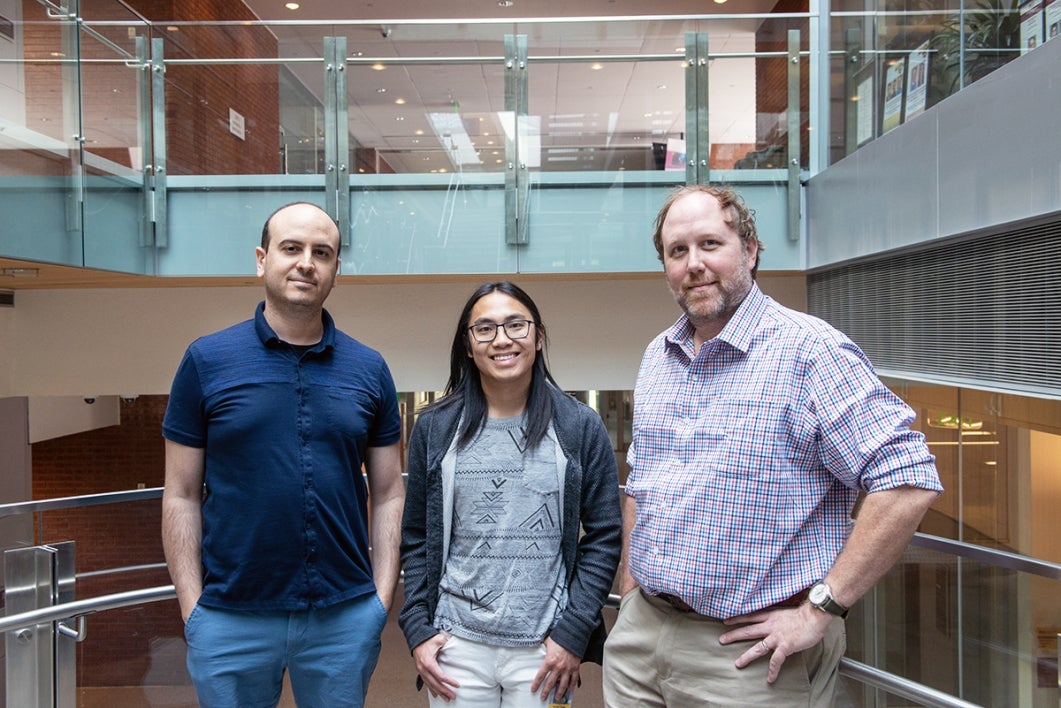ASU student receives NSF Graduate Research Fellowship for DNA origami research

NSF Graduate Research Fellowship recipient Bryan Ugaz. Photo by Mary Zhu/School of Molecular Sciences
Imagine creating and folding tiny, intricate shapes and structures, made from DNA, that can deliver drugs to specific targets in the body, potentially reprogramming the body to fight off diseases, including cancer.
Cancer is a leading cause of illness and death in the developed world. In 2019, over 1.7 million individuals in the U.S. alone were diagnosed with cancer; 600,000 cases proved fatal. Although new gene therapies, such as oncolytic viruses and chimeric antigen receptor (CAR)-T cell therapy have proven effective in late-stage cancers, their high costs pose an unreasonable burden upon patients.
To make treatments more widely available and affordable, doctoral student Bryan Ugaz, from Arizona State University's School of Molecular Sciences, has been awarded a highly competitive National Science Foundation Graduate Research Fellowship grant to pursue research using DNA origami as a gene delivery system to create anti-cancer T-cells and CAR-T cells in situ.
WATCH: Ugaz talks about his research
This involves using a DNA origami nano-cage as a "synthetic virus" to deliver genes to T-cells. If successful, this approach would enable logic-gated, "locked" nanostructures, which only will release the genetic cargo if specified RNA "keys" that specify the cell type are present. This work would have powerful implications in immunotherapy and genetic engineering of T-cells to kill cancer.
In DNA origami, a viral genome (scaffold strand) is folded into a user-defined 2D/3D object by a series of short 20–60 base-pair staple strands, which selectively bind to regions of the genome, generating the desired nanostructure. Compared with their viral or lipid-based counterparts, DNA origami nanostructures are dynamic and site-addressable.
CAR-T cell and oncolytic viral therapies have been approved by federal agencies. If successful, this project will lay important foundations for increasing the accessibility of both therapies by leveraging potentially cheaper materials (oligonucleotides) and making the therapy available for general use rather than being patient specific, which is a drawback of current therapies.
Ugaz is conducting this research with two advisors, School of Molecular Sciences professors Jeremy Mills and Nicholas Stephanopoulos.
Bryan Ugaz (center) with advisors Nicholas Stephanopoulos (left) and Jeremy Mills. Photo by Mary Zhu/School of Molecular Sciences
“Bryan's work focuses on using programmable DNA nanostructures to template complex and highly asymmetric protein-based nanostructures," Stephanopoulos said. "One of the big limitations of protein design for nanotechnology is that it is still hard to make shapes with the complexity of DNA origami, due to the lack of unique protein-protein interfaces needed. Bryan's work, in effect, 'piggybacks' off the addressability of DNA nanostructures to attach proteins in defined locations and crosslink them into novel and addressable shapes.”
Mills added, “Among the unique approaches Bryan has chosen to address these difficult goals is the inclusion of non-canonical amino acids (amino acids that do not exist in nature, ncAAs) into these proteins. The use of functional ncAAs in protein engineering is highly innovative and will enable novel functions in these protein materials not possible in nature.”
Mills and Stephanopoulos agreed about Ugaz's bright future.
“Bryan is a hardworking and highly innovative graduate student, and they are always coming up with new ideas and experiments to try,” Mills said.
Stephanopoulos said, “The NSF GRFP is a great recognition of their potential, and both of their advisors look forward to many exciting projects in the years to come.”
More Science and technology

Transforming Arizona’s highways for a smoother drive
Imagine you’re driving down a smooth stretch of road. Your tires have firm traction. There are no potholes you need to swerve to…

The Sun Devil who revolutionized kitty litter
If you have a cat, there’s a good chance you’re benefiting from the work of an Arizona State University alumna. In honor of…

ASU to host 2 new 51 Pegasi b Fellows, cementing leadership in exoplanet research
Arizona State University continues its rapid rise in planetary astronomy, welcoming two new 51 Pegasi b Fellows to its exoplanet…


